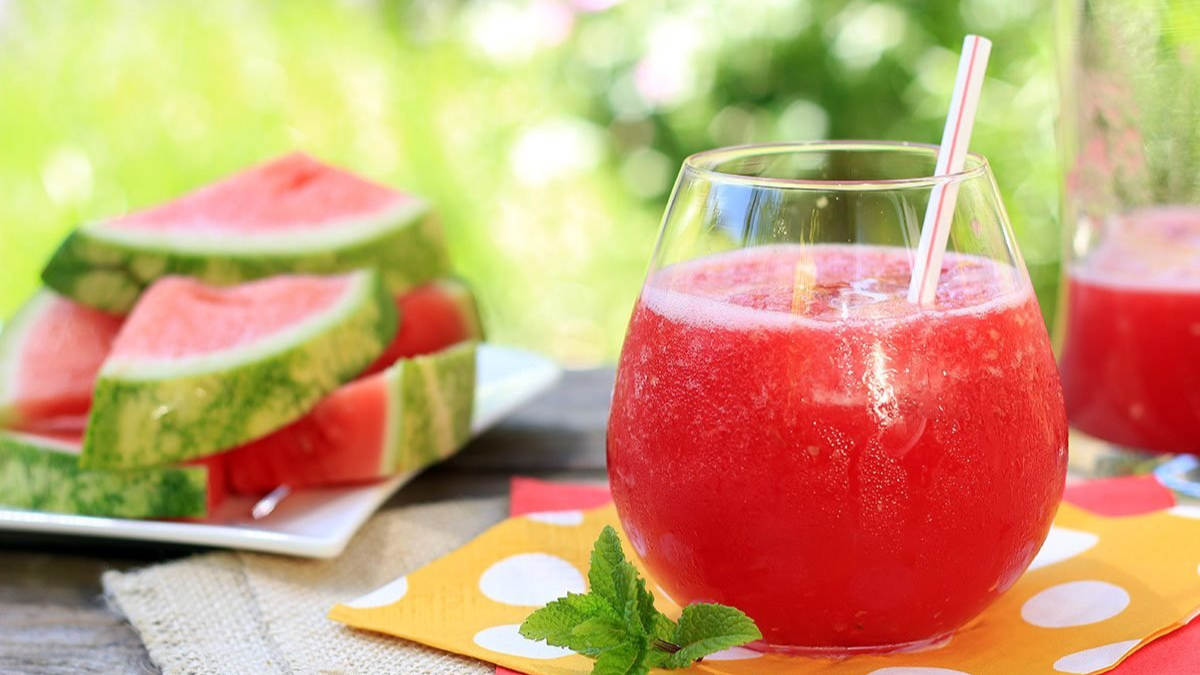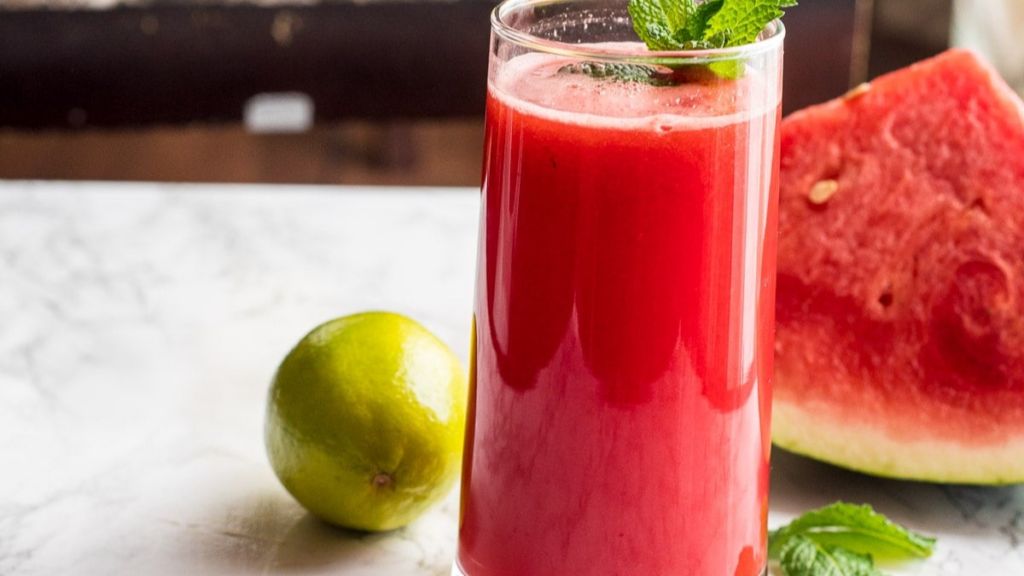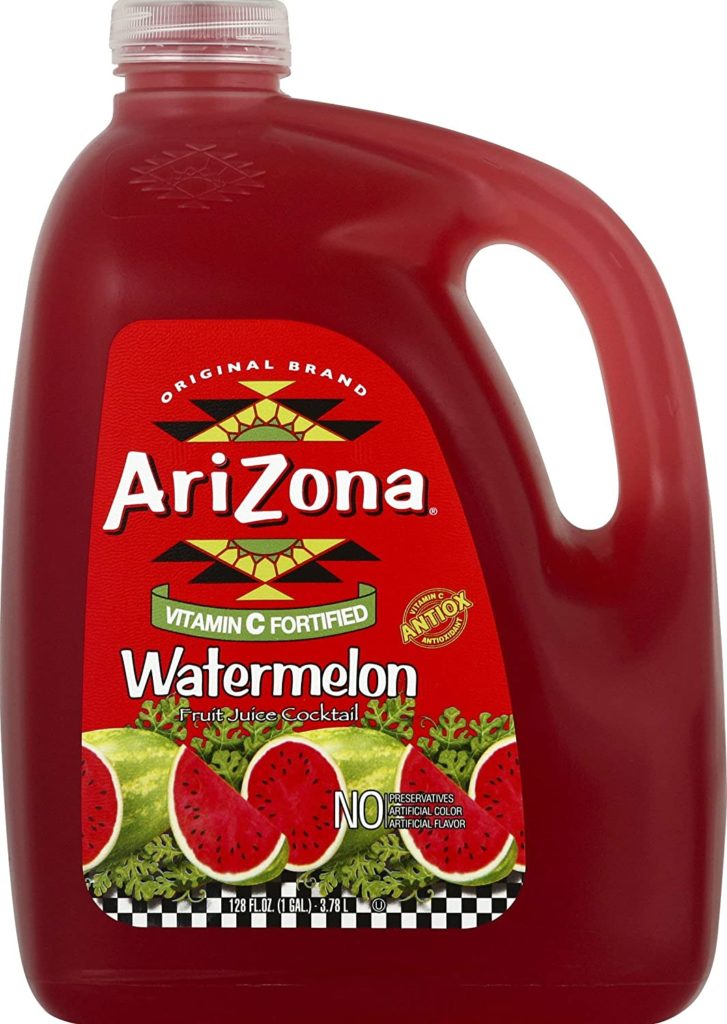Watermelon juice is a refreshing drink that both children and adults enjoy, and it easily ranks first on the health charts for the greatest summer drink. Watermelon juice has a cooling impact on our body, thanks to its abundance of water and critical nutrients. Juice from a watermelon Vitamins A, B6, B1, and C abound, each of which is valuable to humans in its manner.
Lycopene, a component found in watermelon juice, works with Beta-carotene to keep the heart robust and stable. Watermelon juice keeps you energetic all day, lowers blood pressure, and hydrates and moisturizes your skin. Potassium helps to keep your heart healthy, and your skin and hair look great.
Watermelon is one of the most widely consumed and flavoured fruits. It contains several vital nutrients and minerals and the obvious presence of water (thus the name). Let’s look at the health advantages of watermelon juice and see how you can acquire all of these nutrients and minerals without wasting any? Blend them and drink them as a juice, of course.
Watermelon Juice Nutrition Facts
Watermelon Juice’s Health Benefits
Scientists have discovered watermelon juice’s health benefits recently, even though the modest, thirst-quenching watermelon is not only a feast for the eyes and taste buds. Vitamins A, B6, and C and antioxidants and amino acids are abundant in a completely ripe watermelon with delicious red flesh. Watermelon juice created at home is quick and easy to make, but it’s also lower in sugar than store-bought juice. Here’s a rundown of undiscovered Homemade Watermelon Juice Health Benefits:
Properties that are Antioxidant and Anti-Inflammatory
Watermelon juice includes a high amount of lycopene, a powerful antioxidant and anti-inflammatory ingredient, and flavonoids and carotenoids, making it the fruit of choice in the fight against free radicals. Fresh watermelon or watermelon juice consumed regularly can assist in counteracting the effects of oxidative stress and free radicals that promote premature aging. Read about the top ten anti-inflammatory foods as well.
Lycopene, a potent antioxidant found in watermelons, is vital for maintaining a healthy heart. Citrulline, an amino acid found in watermelons, helps relax and widen the heart muscles, boosting blood circulation and general cardiovascular health. Watermelon’s carotenoids help prevent the hardening of the heart vessels, lowering the risk of heart disease and stroke.
Bones in Good Shape
Watermelon’s lycopene, combined with the calcium it contains, helps strengthen our bones by preventing bone resorption. The process of bone resorption, which involves the transfer of calcium from the bones to the blood, is the leading cause of osteoporosis. Learn more about foods that promote bone strength and health.
Stronger Muscles
Watermelon juice is abundant in potassium, which is necessary for the proper functioning of our body’s muscles and neurons. Potassium is a natural electrolyte that our bodies demand following exercise, and potassium deficiency causes aches and pains in our muscles. Watermelon is highly suggested for helping to relieve aches and pains after an exercise.
Diabetes Should be Managed
Diet and exercise regimens are typically suggested for patients with borderline diabetes to control and maintain blood sugar levels. Our bodies transform compounds present in watermelons into arginine, an amino acid. Arginine aids in the maintenance of insulin sensitivity in our bodies, thereby preventing the onset of diabetes.
It Aids in Keeping you Hydrated
Staying hydrated is essential for nutritional health and encourages proper physiological functioning. Water is necessary for body temperature regulation, normal organ function, cell nutrient delivery, and alertness. Watermelon is 92 percent water, making it an excellent choice for daily water consumption. It also has a low-calorie density, which may help with weight loss by making you feel fuller for longer.
Nutrient-Dense and Phytochemically Helpful
Potassium, magnesium, and vitamins A and C are among the minerals found in watermelon. It’s also high in citrulline, an amino acid that may help you perform better during exercise. These molecules help fight free radicals, which can harm your cells if they build up in your body, leading to diabetes, heart disease, and other diseases.
It May have Anti-cancer Properties
Watermelon contains various plant components that may have anticancer properties, including lycopene and cucurbitacin E. Lycopene works by decreasing the amounts of a hormone in the blood that encourages cell division. Cucurbitacin E may decrease tumour growth by inducing cancer cell autophagy, which is important since cancer develops when cell division becomes uncontrollable.
Is it Healthy to Drink Watermelon Juice Daily?
Watermelon juice keeps you energetic all day, lowers blood pressure, and hydrates and moisturizes your skin. Potassium helps to keep your heart healthy, and your skin and hair look great. Watermelons are juicy and sweet, and they’re also quite healthful. Drinking watermelon juice regularly will help you reap the benefits of this fruit. Summer has here, and with it, the juicy and refreshing watermelons. Watermelon is one of the most popular summer fruits, and its high water content makes it a must-have during the hot season.
According to the American Cancer Society, watermelon is high in lycopene, but if you consume it every day, you may get nausea, diarrhea, indigestion, and bloating. The high water content, antioxidants, and amino acids in watermelon may help you get a better workout. It’s also abundant in potassium, a nutrient that may help prevent cramping in the gym. You can also drink watermelon juice after you’ve worked up a sweat. As long as you don’t push yourself too hard, this could help prevent muscle discomfort.
What is the Best Time to Drink Watermelon Juice?
After 7 p.m., I would not recommend eating watermelon or any other fruit. Watermelon is slightly acidic; therefore, eating it late at night may cause digestion to be delayed. Watermelon is best eaten between 12 and 1 p.m. when the digestive system is most active.”Yes, you can eat watermelon on an empty stomach. When watermelon is ingested on an empty stomach, the body absorbs all-important nutrients. Watermelon eaten on an empty stomach can assist in relieving hyperacidity.
However, between May and September is the greatest time to buy. That’s when the four biggest watermelon-growing states—Florida, Texas, California, and Georgia—start producing, accounting for two-thirds of the US harvest and keeping store shelves stocked. The greatest time to eat watermelon is first thing in the morning. Watermelon has a low-calorie count and is high in electrolytes. It’s healthy, light, and refreshing, and it’s the perfect way to start a summer morning.
Is it True that Watermelon Juice is Excellent for the Kidneys?
Watermelon is a natural diuretic that helps to improve urine flow without putting strain on the kidneys (unlike alcohol and caffeine). Watermelon aids the liver in the processing of ammonia (waste from protein digestion), which relieves renal strain while removing extra fluids. Potassium builds up in the blood due to damaged kidneys, causing major heart difficulties. Many fruits and vegetables contain potassium, such as bananas, potatoes, avocados, and melons. Watermelon (1 cup per day) is one of the healthy summer fruit options for most Chronic Kidney Disease and Dialysis patients.
Watermelon is high in vitamin C, beta carotene, and lycopene, a phytochemical with antioxidant properties. However, if you consume a large amount of fruit daily, you may develop issues due to an excess of lycopene or potassium. According to the American Cancer Society, consuming more than 30 mg of lycopene per day can cause nausea, diarrhea, indigestion, and bloating.
Is Watermelon Juice Good for your Skin?
Anyone with dehydrated skin will benefit from applying watermelon to their skin. Watermelons include vitamin C, which helps you achieve soft and beautiful skin. Watermelons can perform wonders on sunburned skin since they contain minerals and antioxidants that reduce irritation and redness. Watermelon is high in nutrients that are beneficial to the skin. It contains vitamins A, B, and C, which help to nourish and protect your skin. These vitamins also aid in collagen formation, making skin appear brighter, fading spots, and generally refreshing and revitalizing the skin.
Watermelon is high in antioxidants and vitamins, which help to slow down the aging process. Its chemicals open up and decrease your pores. Not only that but massaging your skin with watermelon daily will increase the suppleness and firmness of your skin. Watermelon can help reduce pore size and oil production by being applied to the face. Watermelons are beneficial for dry skin because of their high water content. Anyone with dehydrated skin will benefit from applying watermelon to their skin. Watermelons include vitamin C, which helps you achieve soft and beautiful skin.
Is Watermelon Juice Good for Weight Loss?
Because watermelon juice is high in amino acids, it helps you stay hydrated while also burning calories. Watermelon juice contains about 100 calories per 100 mL. That’s not awful! Continue reading: These six weight-loss beverages are perfect for bedtime! Watermelon is one of the best fruits to eat if you’re attempting to lose weight because it contains 90% water. Only 30 calories are in a 100-gram serving. It’s also a good source of arginine, an amino acid that aids in fat burning. Watermelon: This hydrating fruit high in lycopene will boost your arginine levels, an amino acid that boosts your body’s fat-burning ability.
At the same time, as the luscious red fruit aids in fat loss, it also aids in the development of lean muscle. It only takes one cup every day to get the job done. Watermelon Juice Has a Long List of Health Benefits, From Cancer Prevention to Digestion Aid. Watermelons are juicy and sweet, and they’re also quite healthful. Drinking watermelon juice regularly will help you reap the benefits of this fruit. Summer has here, and with it, the juicy and refreshing watermelons.
Watermelon Juice Good for Diabetes?
A little quantity of fresh-cut watermelons or a glass of fruit juice can help people with type 2 diabetes in various ways. Despite having a high glycemic index (GI) of 72, watermelons have a low glycemic load (GL) of 2 per 100-gram serving. Watermelon is safe to eat in moderation by individuals with diabetes. Watermelon and other high-GI fruits, on the other hand, should be eaten with foods that are high in healthy fats, fibre, and protein. Watermelon, in general, has natural sugars that might elevate blood sugar levels.
However, if you eat a small amount, such as a cup of diced watermelon, the effect on blood sugar is minimal. Taking little portions of watermelon in moderation may benefit patients with diabetes. Except for pineapple and watermelon, most fruits have a low to moderate GI. 9 That’s not to say you can’t eat pineapple or watermelon unless you want your blood sugar to soar. Even so, some nutrient-dense foods have a higher GI than low-nutrient ones.
Conclusion
Watermelon juice has numerous applications. It’s a popular summer drink because it’s easy to get by. It comes with a slew of health advantages. It keeps you hydrated and gives you many nutrients you need. It is possible to maintain healthy body weight while simultaneously keeping the heart healthy. It also enhances the condition of the kidneys. Watermelon juice can be applied directly to the skin. A scrape can be made from thicker juice. Allow the watermelon pulp to sit on your skin for a few minutes to watch how it exfoliates your skin. It absorbs all nutrients right into the skin, leaving you appearing fresh and youthful. It softens the skin and, if necessary, eliminates tan.




